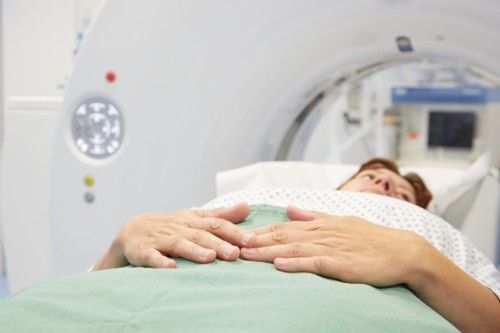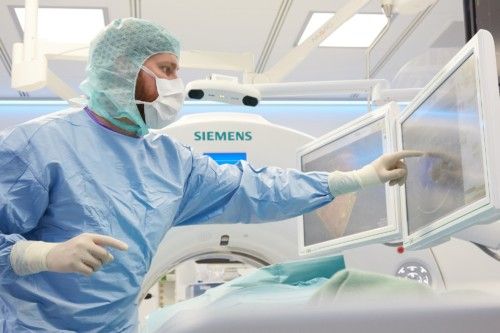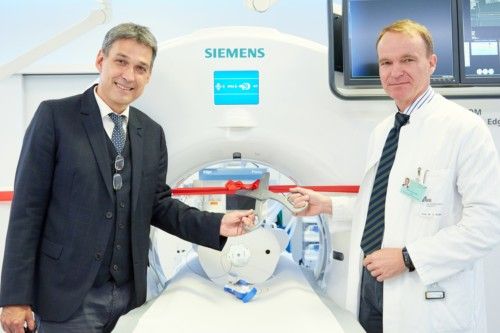New interventional CT for the removal of tumors
Today, Tuesday, the Center for Radiological-Interventional Oncology (RIO) at the University Hospital of Regensburg (UKR) officially opened a new interventional CT with computer-assisted navigation system for the minimally invasive removal of tumors. The state-of-the-art device offers cancer patients who cannot be treated by conventional means a new therapy option with short treatment time and high accuracy.
Inoperable. Peter K received this diagnosis. (name changed) after the discovery of his liver tumor. Surgical removal of the malignant tumor was not possible because the tumor grew too close to all central hepatic vessels. First a devastating finding. But for Peter K. there was hope: The Center for Radiological Interventional Oncology at the UKR offers patients like him a treatment option. The liver tumor was removed gently and with millimeter precision using thermal tumor ablation. In this new procedure, a probe is placed in the body under CT guidance, which destroys a tumor or metastases in a minimally invasive way, for example by applying heat.
On 10. July 2018, a new intervention computed tomography (intervention CT) scanner was officially inaugurated at the RIO Center, which is now available to patients such as Peter K. is reserved. “With the new interventional CT, we can plan radiological interventional procedures independently of diagnostic examinations or emergencies. Our patients benefit from fast treatment, short waiting times and gentle anesthesia. With this CT, we are expanding our capacities and, thanks to the state-of-the-art equipment of the machine, we can offer the highest level of therapy accuracy,” summarized PD Dr. Lukas Beyer, head of the RIO Center at the UKR, summarizes the advantages of the new acquisition.
Part of the intervention CT is also the computer-controlled navigation of the ablation probe, which is only used in a few clinics in Germany. In this procedure, special software calculates the puncture site and angle of the probe used to puncture the tumor based on the CT scan and markers on the patient’s body, and navigates the radiologist during probe guidance in real time.
The result: a probe placed with millimeter precision, a prerequisite for the greatest possible treatment success. The program also simulates the dose of heat, radio waves or electricity needed to completely destroy the tumor during the puncture.
Cancer patients in all of eastern Bavaria benefit from the new interventional CT
“We use computer-assisted navigation for tumor ablation in radiological interventional oncology with great success for inoperable tumors of the liver, prostate, kidney, uterus or bone. Patients can often leave the ward just one day after the procedure,” reported Professor Dr. Christian Stroszczynski, director of the UKR’s Institute of Diagnostic Radiology, of his experience with this treatment method.

“As part of the University Cancer Center Regensburg, the RIO Center with radiological interventional oncology provides an additional therapeutic option for cancer patients in Eastern Bavaria. The expansion of the RIO to include a CT specifically for interventions is an important improvement in the quality of care for these people and thus also strengthens the Comprehensive Cancer Center Ostbayern,” states Professor Dr. Oliver Kölbl, member of the board of the Comprehensive Cancer Center Ostbayern (CCCO) and medical director of the UKR, the importance of CT for the region and its people. The CCCO establishes treatment options for cancer patients in the entire eastern Bavarian region according to the highest medical standards and develops new diagnostic and therapeutic procedures.
It combines clinical care within the interdisciplinary cooperation model of the University Cancer Center Regensburg (UCC-R) with a regional network of hospitals, oncology centers, specialists and general practitioners in private practice, as well as nursing and hospice facilities, and excellent clinical research.

Low-risk anesthesia during the procedure
For Peter K. radiological interventional oncology not only enabled the destruction of his otherwise untreatable tumor, but also a rapid return to everyday life. He recovered quickly from the procedure – also because an anesthetic can be administered that is precisely tailored to it. “Like any medical procedure, general anesthesia involves risks that we want to minimize as much as possible. In interventional radiology, we perform low-risk anesthesia.
A specially trained anesthesia team ensures that the patient safely sleeps through the procedure and gently wakes up again,” explained Professor Dr. Bernhard Graf, Director of the Clinic for Anesthesiology of the UKR, during the inauguration. The spatial location of the new CT also reduces stress for patients: The CT room is directly connected with the angiography.
So if a patient needs an examination or treatment on the blood vessels that also requires imaging after contrast medium administration in the CT, the anesthetized patient can be transported directly from the angiography to the CT room without the need for a second anesthetic.
Not recommended for imitation
During the inauguration of the CT today, participants were able to see for themselves that radiological interventional oncology requires special expertise from the attending physician: When trying to visualize the tumor in an artificial patient on the CT, guide the ablation probe and precisely hit the puncture site, even experienced physicians broke a sweat. Not so PD Dr. Beyer, who has been performing such procedures for many years and has special training in this field.
Within a short time, the test tumor was destroyed by him, which the guests could see for themselves on the control image in the CT room. “It is always a wonderful experience to see patients like Peter K. to be able to say goodbye after a radiological-interventional procedure home. Ultimately, the high-end technology in the RIO Center is operated by people for people,” said PD Dr. Beyer the guests of the inauguration.
(Image rights: © UKR / Franziska Holten)
Contact
University Hospital Regensburg
Franz-Josef-Strauß-Allee 11
93053 Regensburg
